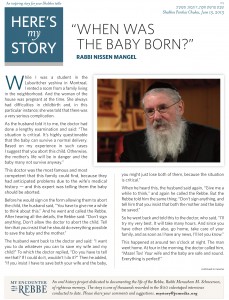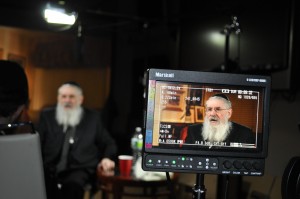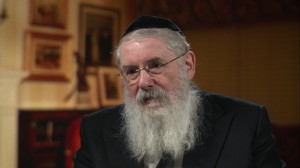HMS: “When was the baby born?”
12 June 2013
While I was a student in the Lubavitcher yeshiva in Montreal, I rented a room from a family living in the neighborhood. And the woman of the house was pregnant at the time. She always had difficulties in childbirth and, in this particular instance; she was told that there was a very serious complication.
As the husband told it to me, the doctor had done a lengthy examination and said: “The situation is critical. It’s highly questionable that the baby can survive a normal delivery. Based on my experience in such cases, I suggest that you abort this child. Otherwise, the mother’s life will be in danger and the baby many not survive anyway.
This doctor was the most famous and most competent that this family could find, because they had anticipated problems due to the wife’s medical history – and this expert was telling them the baby should be aborted.
Before he would sign on the form allowing them to abort the child, the husband said, “You have to give me a while to think about this.” And he went and called the Rebbe. After hearing all the details, the Rebbe said: “Don’t sign anything. Don’t allow the doctor to abort the child. Tell him that you insist that he should do everything possible to save the baby and the mother.”
The husband went back to the doctor and said: “I want you to do whatever you can to save my wife and my child!” To which the doctor replied, “Do you have to tell me that? If I could do it, wouldn’t I do it?” Then he added, “If you insist I have to save both your wife and the baby, you might just lose both of them, because the situation is critical.”
When he heard this, the husband said again, “Give me a while to think,” and again he called the Rebbe. But the Rebbe told him the same thing: “Don’t sign anything, and tell him that you insist that both the mother and the baby be saved.”
So he went back and told this to the doctor, who said, “I’ll try my very best. It will take many hours. And since you have other children also, go home, take care of your family, and as soon as I have any news, I’ll let you know.”
This happened at around ten o’clock at night. The man went home. At four in the morning, the doctor called him, “Mazel Tov! Your wife and the baby are safe and sound. Everything is perfect!”
As soon as he heard this, the husband called up one of the Rebbe’s secretaries, even though it was the middle of the night, because he wanted to get the message to the Rebbe that, thank G-d, everything was okay.
Seven o’clock in the morning he got a telephone call from the Rebbe’s office. The Rebbe wanted to know if the baby was really born at four o’clock in the morning, because according to the Rebbe’s reckoning, the baby was born at half past three. “Please find out when the baby was born.”
The man told all this to me the very next day. He told me that as soon as he had a chance to see the doctor – to hug him and kiss him and thank him – he asked when the baby was born: “I was informed that the baby was born at four o’clock in the morning. But my Rebbe says that, according to his reckoning, it was at half past three. Please tell me exactly when the baby was born.”
“What’s the difference?” asked the doctor. “As long as your wife is healthy and the baby is healthy, what’s the difference when the baby was born?”
“To me it makes absolutely no difference, but obviously to my Rebbe it makes a difference.”
So the doctor looked at the medical chart in front of the baby’s crib. Sure enough it was marked “Four o’clock.” But then the doctor called in the chief nurse and asked her, “How did you mark the time? When the baby is born, or when it was brought into the nursery?”
After a baby is born, they go through all kinds of procedures. They remove the placenta, they examine the baby, wash it, wrap it, put it in a crib. And all this normally takes a half hour. Not until they roll the baby into the nursery did they mark the medical chart.
So the baby was born at half past three, just like the Rebbe said.
Realizing this, the doctor wanted to know more: “Your Rebbe was correct, but tell me, because now I’m very curious to find out, what’s the difference to him?”
The man called the Rebbe’s office to satisfy this doctor’s curiosity. And the Rebbe’s answer was: “I could not go to sleep until I was sure that the mother and the baby were safe and sound. And at half past three I was able to go to sleep.”
Rabbi Nissen Mangel is an author and speaker, and serves as rabbi of congregation Ksav Sofer in Brooklyn, NY. During the winter of 2012, he was interviewed several times in the My Encounter studio in New York.
This week’s Here’s My Story is dedicated
By Avremi & Dvora New
While I was a student in the Lubavitcher yeshiva in Montreal, I rented a room from a family living in the neighborhood. And the woman of the house was pregnant at the time. She always had difficulties in childbirth and, in this particular instance; she was told that there was a very serious complication.
As the husband told it to me, the doctor had done a lengthy examination and said: “The situation is critical. It’s highly questionable that the baby can survive a normal delivery. Based on my experience in such cases, I suggest that you abort this child. Otherwise, the mother’s life will be in danger and the baby many not survive anyway.
This doctor was the most famous and most competent that this family could find, because they had anticipated problems due to the wife’s medical history – and this expert was telling them the baby should be aborted.
Before he would sign on the form allowing them to abort the child, the husband said, “You have to give me a while to think about this.” And he went and called the Rebbe. After hearing all the details, the Rebbe said: “Don’t sign anything. Don’t allow the doctor to abort the child. Tell him that you insist that he should do everything possible to save the baby and the mother.”
The husband went back to the doctor and said: “I want you to do whatever you can to save my wife and my child!” To which the doctor replied, “Do you have to tell me that? If I could do it, wouldn’t I do it?” Then he added, “If you insist I have to save both your wife and the baby, you might just lose both of them, because the situation is critical.”
When he heard this, the husband said again, “Give me a while to think,” and again he called the Rebbe. But the Rebbe told him the same thing: “Don’t sign anything, and tell him that you insist that both the mother and the baby be saved.”
So he went back and told this to the doctor, who said, “I’ll try my very best. It will take many hours. And since you have other children also, go home, take care of your family, and as soon as I have any news, I’ll let you know.”
This happened at around ten o’clock at night. The man went home. At four in the morning, the doctor called him, “Mazel Tov! Your wife and the baby are safe and sound. Everything is perfect!”
As soon as he heard this, the husband called up one of the Rebbe’s secretaries, even though it was the middle of the night, because he wanted to get the message to the Rebbe that, thank G-d, everything was okay.
Seven o’clock in the morning he got a telephone call from the Rebbe’s office. The Rebbe wanted to know if the baby was really born at four o’clock in the morning, because according to the Rebbe’s reckoning, the baby was born at half past three. “Please find out when the baby was born.”
The man told all this to me the very next day. He told me that as soon as he had a chance to see the doctor – to hug him and kiss him and thank him – he asked when the baby was born: “I was informed that the baby was born at four o’clock in the morning. But my Rebbe says that, according to his reckoning, it was at half past three. Please tell me exactly when the baby was born.”
“What’s the difference?” asked the doctor. “As long as your wife is healthy and the baby is healthy, what’s the difference when the baby was born?”
“To me it makes absolutely no difference, but obviously to my Rebbe it makes a difference.”
So the doctor looked at the medical chart in front of the baby’s crib. Sure enough it was marked “Four o’clock.” But then the doctor called in the chief nurse and asked her, “How did you mark the time? When the baby is born, or when it was brought into the nursery?”
After a baby is born, they go through all kinds of procedures. They remove the placenta, they examine the baby, wash it, wrap it, put it in a crib. And all this normally takes a half hour. Not until they roll the baby into the nursery did they mark the medical chart.
So the baby was born at half past three, just like the Rebbe said.
Realizing this, the doctor wanted to know more: “Your Rebbe was correct, but tell me, because now I’m very curious to find out, what’s the difference to him?”
The man called the Rebbe’s office to satisfy this doctor’s curiosity. And the Rebbe’s answer was: “I could not go to sleep until I was sure that the mother and the baby were safe and sound. And at half past three I was able to go to sleep.”
Rabbi Nissen Mangel is an author and speaker, and serves as rabbi of congregation Ksav Sofer in Brooklyn, NY. During the winter of 2012, he was interviewed several times in the My Encounter studio in New York.
This week’s Here’s My Story is dedicated
By Avremi & Dvora New








No Comments to “HMS: “When was the baby born?””